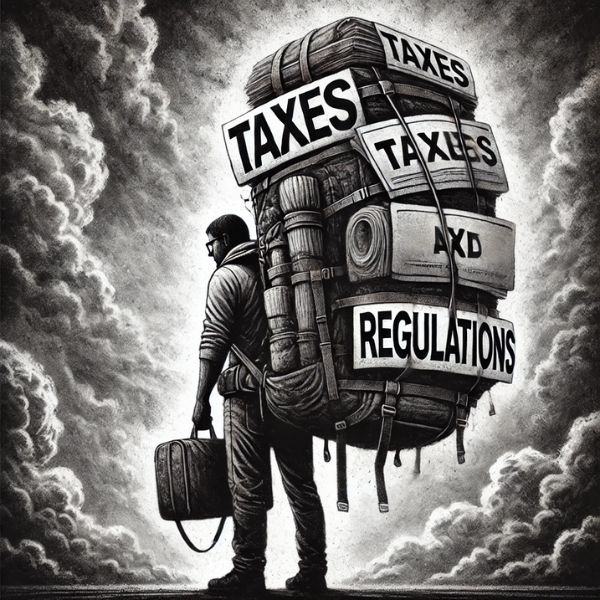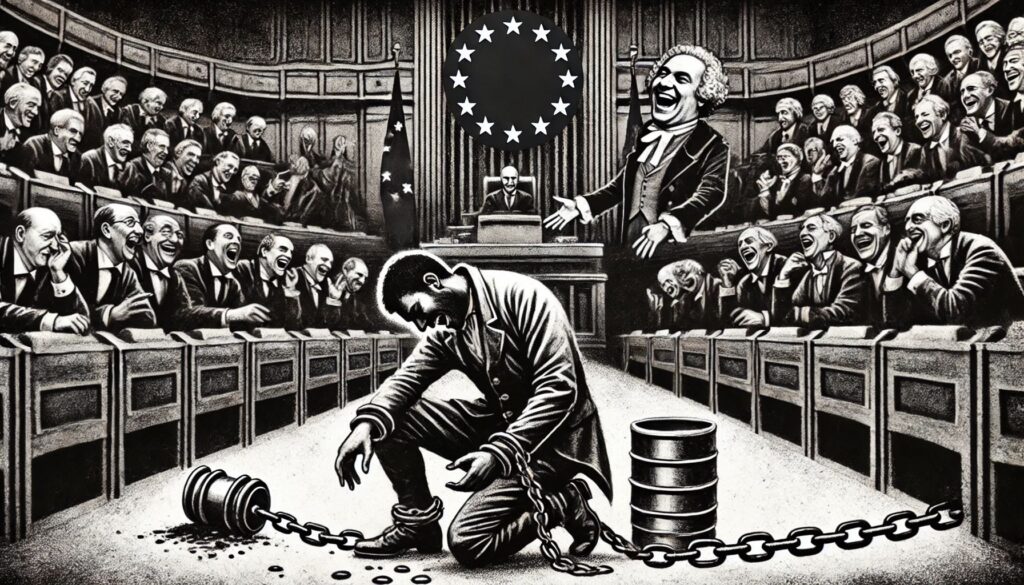Indice del artículo
Cryptocurrencies in Europe: Taxes and Unrealized Gains
Nomad, open your eyes, because what’s happening in Europe deserves your full attention. Did you know that simply investing and risking your money is no longer enough? No, that would be too easy. Now, they want to tax you on what you haven’t even sold. Yes, you read that right: taxes on unrealized gains! And, as always, the fiscal laboratory is France.
This new tax proposal, spearheaded by France, threatens to become the flagship model for the rest of Europe. Picture this: you’re holding onto your Bitcoin, perhaps waiting for the market to rise further, but in the meantime, bureaucrats decide that your hypothetical gains should fill the state’s coffers. Is this fiscal innovation, or an outright attack on your financial freedom?
Europe seems to be on a crusade to reinvent the fiscal wheel, but all it achieves is discouraging investment and impoverishing those striving to succeed. Today, I’ll break down how this measure—seemingly exclusive to France—is just one step away from spreading across the entire continent. And, most importantly, how you can protect your wealth before it’s too late.
Get ready to dismantle this new offensive against digital assets and understand why true nomads are already seeking alternatives far from Europe’s radar. Let’s dive in!

Cryptocurrencies in Europe: Taxes and Unrealized Gains – What Is “Unproductive Wealth”?
Nomad, let’s cut to the chase: what on earth does “unproductive wealth” mean? Essentially, it’s the bureaucrats’ latest invention to give a fancy name to what is, in reality, a fiscal robbery. According to a proposal by French Senator Sylvie Vermeillet, cryptocurrencies you haven’t sold—and which might even be losing value as you read this—should be taxed as if they were a tangible source of wealth.
The reasoning behind this brilliant idea? If you own something of value, even if you haven’t turned it into cash, you’re already “potentially rich.” So, your long-term Bitcoin investment or that NFT you’re hoping will pay off someday becomes the perfect target to replenish the government’s empty coffers.
This tax doesn’t just affect the wealthy elite. Don’t be fooled into thinking it’s a measure against the “ultra-rich.” In reality, these policies hit individual investors and the middle class the hardest—those who can’t afford an army of tax attorneys to shield their assets.
If this proposal gains traction in France, how long do you think it will take for it to become a fiscal trend across Europe? Let’s be honest: when it comes to squeezing taxpayers, politicians know no borders. This isn’t innovation; it’s a desperate attempt to prop up an economic system that’s already on shaky ground.
The Fiscal Epidemic in Europe: Denmark, Italy, and the Cryptocurrency Domino Effect
Nomad, if you thought this was just a French problem, I have bad news: the fiscal epidemic is already spreading across Europe. When it comes to “creative” ways of increasing revenue, governments seem to be competing to see who can strangle their citizens faster.
Denmark has already put forth its own proposal: starting in 2026, it plans to tax unrealized cryptocurrency gains. What does this mean? If your Bitcoin is worth €100,000 on December 31, 2026, but drops to €50,000 on January 1, 2027, you’ll still pay taxes as if it were worth €100,000. A brilliant move, isn’t it? Because, of course, no one understands the market better than the bureaucrats in power.
But it doesn’t stop there. Italy is also joining the race. In its latest budget reform, it decided to hike taxes on cryptocurrency capital gains to an astonishing 46%. That’s right—nearly half of your earnings will go straight to the state, clearly showing that discouraging investment is the new national sport in some European countries.
The pattern is clear: Europe not only fails to foster innovation, it punishes it. Meanwhile, countries that understand the value of capital and talent, like El Salvador, Panama, or Paraguay, are opening their doors to investors with favorable fiscal policies.

Impact on Investors: From Bitcoin to Real Estate
Nomad, if you thought these fiscal policies would only target the market’s big players, it’s time to rethink. The new tax measures, such as taxing unrealized gains, do not differentiate between the small saver who bought their first Bitcoin and the investment fund managing luxury real estate. Everyone, absolutely everyone, is in the crosshairs.
But it doesn’t stop at digital assets. Real estate, traditionally seen as a safe haven for investors, is also under threat. If unrealized gains become a fiscal target, properties increasing in market value could be taxed before you can capitalize on those gains. This could stall the sector’s growth and shrink the housing supply, further driving up prices for buyers.
And what about big capital? Of course, it’s affected too, but with one crucial difference: it can move. Investment funds, companies, and ultra-wealthy individuals can shift their capital to jurisdictions with friendlier tax policies. Meanwhile, the average citizen remains trapped in a system designed to squeeze them dry.
International Comparison: The U.S. and Its “Fiscal Creativity”
Nomad, Europe doesn’t hold the monopoly on absurd fiscal ideas. Across the Atlantic, the United States has long shown that “fiscal creativity” is an art form it also masters. And we’re not just talking about taxing unrealized gains but something even more controversial: the citizenship tax.
In the U.S., your tax obligations follow your citizenship, no matter where you live or work. This citizenship-based tax system means that even if you move to a low-tax country, your income remains taxable. The only escape? Renouncing your citizenship—an expensive, bureaucratic process often accompanied by an “exit tax” on your assets.
France, ever eager to innovate in tax collection, is now flirting with this idea. Recently, the notion of imposing a similar tax on French citizens living abroad has been debated. The excuse? Ensuring everyone contributes, no matter where they are. The real goal? Locking you into a fiscal system you can’t escape.
But let’s circle back to the U.S., where fiscal creativity doesn’t stop at citizenship taxation. During the Obama administration, the idea of taxing unrealized gains on certain assets was proposed as a way to combat tax evasion. Although the measure didn’t pass, it set a dangerous precedent—one that countries like France seem keen to follow.
Now, with President-elect Trump, this idea is likely to vanish from the U.S. agenda. But in a Europe increasingly fragmented and embracing socialist fiscal policies, the inevitable question arises: How long before it becomes a reality across the Atlantic? What do you think?

New Measures in Europe for Cryptocurrency and Digital Asset Control
Nomad, Europe is relentless in its pursuit to regulate every corner of the cryptocurrency ecosystem and digital assets. Beyond the DAC8 directive, a series of measures have been implemented to tighten surveillance and regulation in this ever-evolving space.
Markets in Crypto-Assets Regulation (MiCA)
Effective from December 30, 2024, the MiCA regulation introduces a comprehensive framework for crypto-assets within the European Union. This regulation enforces transparency and disclosure requirements for the issuance, public offering, and trading of crypto-assets on platforms. It also mandates that crypto-asset service providers obtain authorization to operate in the EU, subjecting them to oversight by national authorities and entities like the European Securities and Markets Authority (ESMA).
DAC8 Directive
The European Union has heightened its scrutiny of cryptocurrencies through the DAC8 directive, which expands reporting obligations and enables the seizure of crypto-assets. This directive strengthens tax cooperation among EU member states and aims to enhance fiscal transparency and combat fraud. However, self-custodied cryptocurrencies, stored in personal wallets without third-party involvement, remain immune to seizures due to their decentralized nature.
Digital Operational Resilience Regulation (DORA)
Complementing MiCA, DORA focuses on ensuring financial entities, including crypto-asset service providers, can withstand, respond to, and recover from incidents related to information and communication technologies.
These measures highlight Europe’s resolve to create a robust regulatory environment that, according to authorities, aims to protect investors and ensure financial stability. Yet, they also raise questions about privacy, innovation, and competitiveness in the realm of cryptocurrencies and digital assets.

Alternatives to Protect Your Wealth: Residencies and Territorial Tax Systems
Nomad, amidst an increasingly hostile environment for digital assets and investments, it’s time to explore the alternatives offered by countries with more favorable tax systems. As Europe moves towards absolute control of your finances, geographic and financial diversification becomes essential for protecting your wealth.
Strategic Tax Residencies
Territorial tax systems offer a breath of fresh air for those seeking to reduce their tax burden without compromising legality. Countries like Panama, Paraguay, and El Salvador lead this list. Under these regimes, you only pay taxes on income generated within the country, keeping your international earnings off the fiscal radar. This is particularly advantageous if your gains come from cryptocurrencies or global assets.
For instance, securing residency in Paraguay not only means minimal taxes but also a competitive cost of living. Meanwhile, El Salvador’s pro-Bitcoin policies attract crypto investors and provide a fiscal environment designed to safeguard financial privacy.
International Financial Diversification
Relocating isn’t enough; diversifying your assets across solid jurisdictions is key. Banks in Switzerland, the United States, or Georgia offer not just security but also financial privacy. Additionally, using cryptocurrencies to conduct transactions beyond the reach of restrictive regulations has become a standard practice for those who value economic freedom.
Personalized Action Plans
Every case is unique, and at Nomad Tax, we’ve guided hundreds of nomads and entrepreneurs in crafting tailored fiscal and residency strategies. From selecting the right jurisdiction to opening offshore accounts, our goal is to ensure you operate securely while leveraging the full legal benefits these systems provide.
Conclusion: Protect Yourself from Fiscal Control with Smart Strategies
Nomad, what we’ve analyzed isn’t just a trend; it’s an impending reality. Europe is building a system designed to squeeze its citizens under the banners of fiscal justice and transparency. From taxing unrealized gains to enforcing increasingly invasive regulations, the message is clear: if you don’t act, you’ll become just another pawn on their board.
But there is a way out. Diversifying your wealth, changing your tax residency, and opting for fairer systems aren’t merely options—they’re necessities in this context. Countries with territorial taxation, such as Panama or Paraguay, or pro-cryptocurrency policies like El Salvador, prove that there are places where your efforts and vision can be rewarded, not punished.
The key lies in planning. At Nomad Tax, we understand that every case is unique and that financial freedom cannot be left to chance. We design bespoke strategies to help you regain control over your money and your future. Because, in the end, it’s not just about protecting your wealth—it’s about ensuring that what you work for is truly yours.
Are you ready to step out of the system that’s holding you back? Write to us. The time to act is now. Freedom isn’t waited for; it’s built.



